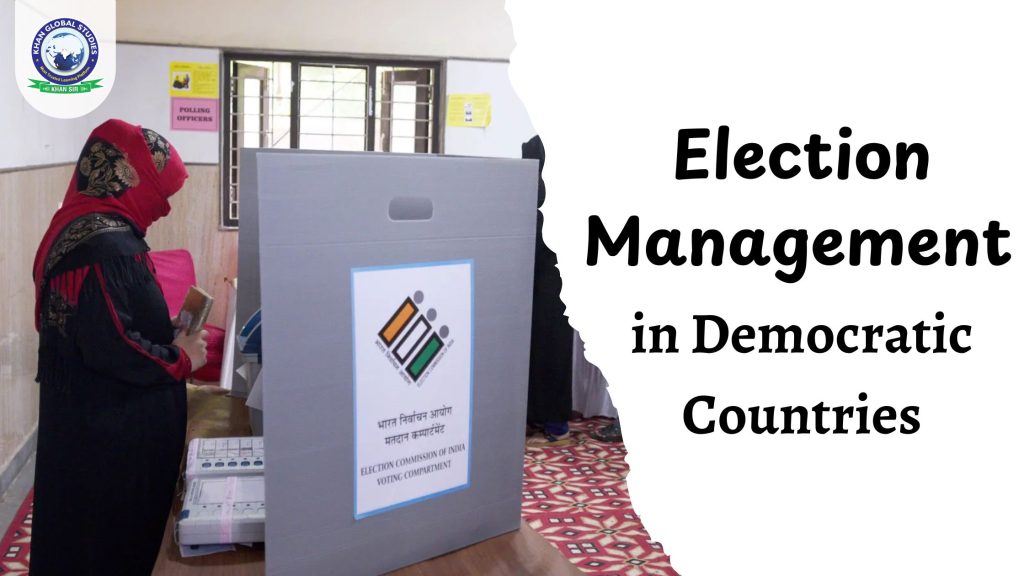Elections in democratic countries are an important process that helps maintain the voice of citizens. Conducting fair, transparent, and effective elections is a complex task that requires considerable resources and financial management. In this detailed guide, we will try to understand the complexities of election management, including the budget process, allocation of financial resources, and other requirements of election conduct. This article provides comprehensive information on the processes required for election management and financial planning.
Importance of Financial Management in Elections
Effective election management is essential to maintain the legitimacy of elections in any democratic country. Regular elections require constant financial planning, budget management, and adherence to the legal framework. The Election Management Body (EMB) is responsible for conducting all election-related activities smoothly and legally. For this, they follow the following procedures:
- Preliminary Cost Estimation: The EMB first makes a preliminary estimate of the cost, taking into account the number of voters, constituency, required resources, security requirements, and logistics.
- Structural Development of the Budget: Based on this assessment, a comprehensive budget is prepared, which includes estimated expenditures for all phases of the election. The budget is divided into categories to allow better allocation and monitoring.
- Allocation of Resources: Costs are allocated among various agencies. Expenditures for responsibilities such as voter registration, and ballot production are fixed according to the legal framework.
- Adjustment for Unforeseen Circumstances: Sudden changes require reallocations in the budget. The EMB adjusts the budget as needed.
- Monitoring of Expenditure: Regular monitoring and auditing of expenditure is essential during the election process. This helps maintain control over expenditure during the election.
Primary and Ancillary Costs in the Election Budget
Election expenditure is divided into several major categories, which represent various activities required for the smooth conduct of elections.
Main Costs
Main costs are expenditures that are directly linked to the election process, such as:
- Voter Registration: Registration of eligible voters, voter list management and updating according to current demographics.
- Setting up of Polling Stations: Setting up and securing polling stations is a major task, which includes the cost of facilities, staff and security forces.
- Election Day Operations: Printing of ballot papers, arrangement of EVMs, safe transportation of ballot papers and data management are the major costs of electoral processes.
- Administrative Arrangements: This includes administrative requirements such as appointment and training of election officials, setting up of communication systems.
- Counting and Security Arrangements: This includes expenses incurred on the counting process, law enforcement and security measures.
Decentralised Costs
Decentralised costs are those costs that cannot be easily measured but play a vital role in the election process:
- Voter Awareness Campaigns: Making voters aware about the right, process and importance of voting is essential for transparency of elections. This includes the cost of public service campaigns and media support.
- Involvement of Stakeholders: It is important to ensure the participation of civil society organisations and various social groups. The cost of training these groups may be high, but it is essential for free and fair elections.
- Data Security and Voter Registration Assistance: Partnering with civil registry offices for data security can increase voter registration costs.
Transparency Costs
Transparency costs are important to ensure the credibility of the election process:
- EVM Security: Necessary costs include ensuring the security of electronic voting machines, cybersecurity, and data privacy.
- Ethical Election Initiatives: Costs to develop mechanisms to prevent corrupt practices and vote buying.
- Cybersecurity and Media Monitoring: Reliance on digital platforms has increased cybersecurity costs.
- Audit and Monitoring: Regular monitoring of financial flows, campaign spending, and administrative activities ensures accountability at every stage of the election process.
Methods of Budget Allocation for Electoral Expenses
Electoral expenses are allocated in two major ways depending on the election cycle:
- Election year budget: In election years, expenses related to the electoral process are separated from the regular annual budget.
- Non-election year budget: In non-election years, needs such as updating voter lists or educational campaigns are met from the regular budget.
Role of National Election Commissions
For example, in India, the Election Commission is responsible for preparing the election budget. The Ministry of Finance then submits it to Parliament for review.
The budget includes the following expenses:
- Voter list management
- Boundary delimitation
- Voter information campaigns
- Electoral dispute resolution
- Security arrangements
These expenses are mainly taken from the election budget, while some expenses are shared from state and district budgets.
Key Points in the Electoral Budget Process
Electoral budget needs in different countries depend on their social, geographical, economic, and political context. But the following general points are considered:
- Administrative Costs: Salary, training and logistics support of temporary and permanent election staff.
- Logistics Preparations: Setting up of polling stations, transportation and provision of EVMs.
- Security Infrastructure: Maintaining law and order during elections in collaboration with security agencies.
- Technology and Cybersecurity: Investments for EVMs and data security.
Challenges in Election Management
Election management faces many challenges, especially in democratic countries where technological advancement is unevenly spread. Some of the major challenges are:
- High operational costs: Large countries require large budgets to conduct elections.
- Technological limitations: Lack of technology in some regions leads to cost and monitoring problems.
- Transparency and accountability: Records of all expenditures must be maintained.
- Legal compliance and ethical standards: Legal frameworks are created to limit expenditure.
- Adaptability to unforeseen events: External factors may create the need for sudden changes in the budget.
Conclusion
Financial management in democratic elections requires a complex and organised approach to ensure the proper utilisation of resources. With budgeting, monitoring and contingency planning, election management bodies can conduct transparent, fair and inclusive elections.
Frequently Asked Questions
Question: Why is budgeting important in election management?
Answer: Budgeting is important in election management as it ensures that adequate financial resources are available for each stage of the electoral process. This allows elections to be conducted in a fair, transparent and efficient manner.
Question: How is a budget prepared for elections?
Answer: To prepare an election budget, a preliminary assessment of expenses is first made. This includes costs required for voter registration, setting up polling stations, security, logistics and other administrative functions. All these expenses are divided into categories and a detailed budget is prepared.
Question: What are the main and subsidiary costs in election expenses?
Answer:
- Core costs: voter registration, setting up polling stations, vote counting, election officer training and security.
- Ancillary costs: voter awareness campaigns, stakeholder engagement, data security and auditing to maintain transparency.
Question: How are unforeseen expenditures managed in election management?
Answer: The Election Management Body (EMB) maintains a contingency fund for unforeseen circumstances. This fund is used to deal with sudden challenges, such as changes in security requirements or technical problems.
Question: What steps are taken to ensure transparency?
Answer: Regular audits, expenditure monitoring and making financial records publicly available are essential to ensure transparency. In addition, cybersecurity and data protection measures are also included.
Question: What is the role of the National Election Commission in election management?
Answer: The National Election Commission prepares the budget and manages financial resources for election operations. The Commission is responsible for the allocation of resources, monitoring election expenditure and compliance with the legal framework.
Question: What is the importance of technical expenditure in the election budget?
Answer: Technical expenditures such as the purchase of EVMs (Electronic Voting Machines), their security and data management are important to ensure transparency and accuracy of the election process. Also, cyber security measures help maintain digital security.
Question: Why is voter awareness campaign expenditure necessary in elections?
Answer: Voter awareness campaigns make voters aware of their rights and responsibilities. These campaigns are necessary to increase public participation in the election process and improve voting rates.
Question: How is election expenditure monitored?
Answer: A centralized system has been created to monitor election expenditures. This includes regular audits, keeping records of expenditure and their review by government agencies.
Question: What are the challenges in creating an election budget?
Answer:
- High cost: Conducting elections in large democratic countries is expensive.
- Technological limitations: Technical facilities are not available in all areas.
- Unexpected events: Natural disasters, political unrest or changes in security requirements may cause sudden changes in the budget.
- Maintaining transparency: Ensuring accurate records and accountability of all expenditures can be challenging.





